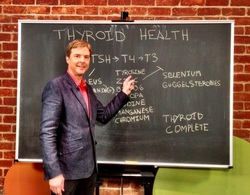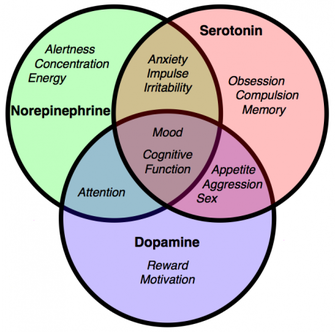 Many of you who watch my daily television program, THINK NATURAL know by now my blackboard is back in full swing. Many of you have requested in the past that I bring it back as it made it easier for you to learn and take notes from my teachings on natural health. Rest assured, the blackboard isn't going away anytime soon and it's use is about to be increased to teach you more and more about maintaining good health and encourage healing in your body. If you have any health subjects that interest you, please let us know. We want to provide with honest, correct information that will optimize your health...naturally!  Neurotransmitter Functions Neurotransmitter Functions Here are some of the differences between dopamine and serotonin deficiency, and the differences how one feels between the two. Depression can be caused by a lack of the neurotranmitter serotonin in the brain. This is the most common form treated, but one must realize that doctors never test for low dopamine levels and always presume that it’s caused by low serotonin levels. This is the reason so many people are taking SSRIs such as Prozac or Zoloft. The other reason for depression caused by a chemical imbalance is it’s caused by a lack of the dopamine in the brain. The type of depressive-feeling caused by a lack of dopamine in the brain is a very low energy depression, with a complete lack of motivation, (and feeling depressed). You may feel frustrated that you don't have any energy. How many of you deal with depression and taking medication, but still lack motivation? I bet most of you all answered yes to the question. If so, why are doctors prescribing anti-depressants that only treat a serotonin problem? When people have low dopamine or low serotonin levels, there are few simple signs to be aware of to help you diagnose the problem. If you are low serotonin, you would be craving carbs, dairy or even bananas. If you are low dopamine, then you tend to reach for stimulating foods such as coffee or chocolate. These only increase dopamine short term and should not be the go-to foods as then you will really get fatigued from stressing your adrenal glands. If your problem is not with serotonin, but only a lack of dopamine, then you probably won't feel much anxiety. You probably also won't have trouble sleeping, but you will have trouble getting going in the morning. Note: if you over-increase your dopamine so that it's too high, you'll feel angry at things that wouldn't normally make you feel angry. The type of depressive-feeling caused by a lack of serotonin in the brain is not really a lack of energy (you won't be high energy, just middle of the road), but rather an empty feeling that there isn't any comfort in the world that is possible for you and you would have feelings of fear. If it is only serotonin that is your insufficiency, and not dopamine, then you probably WILL have trouble sleeping. On my TV show, THINK NATURAL, I teach a lot about being motivated and full of energy. But so many people aren't motivated anymore and their energy levels are diminishing. With the poor choices voters made to fill the White House to the economy to the wars and rumors of wars, it’s no wonder people live in fear and get caught in a rut with worrying which zaps motivation and energy. We don’t need the ‘what’s the use’ mentality. We need something to get us going again. So stop watching the news! Now, let’s talk nutrition. To increase dopamine levels naturally, an herb called Mucuna Pruriens is the best choice. The herb naturally contains L-dopa which the body will convert into dopamine in the brain and yes, it works very quickly. I prefer the brand of Mucuna by HerbalUltra.com which offers the highest grade of Mucuna on the market (call them at 800-200-4180). One capsules a day is usually a great starting dose and for some, one capsule in the morning and one in the afternoon will help you. Food sources of dopamine increasing tyrosine include almonds, avocados, bananas, dairy products, lima beans, pumpkin seeds, and sesame seeds. Dopamine is easily oxidized. Foods that are rich in antioxidants such as fruits and vegetables may help protect dopamine-using neurons from free radical damage. Many healthcare professionals recommend supplementing with vitamins C, vitamin E, and other antioxidants. Foods such as sugar, saturated fats, cholesterol, and refined foods interfere with proper brain function and can cause low dopamine. Consumption of saturated fats and cholesterol should also be reduced because they can clog the arteries to the brain, heart, and other organs. Caffeine must also be avoided by persons with depression. Caffeine is a stimulant which initially speeds up neurotransmission, raises the amount of serotonin, and temporarily elevates mood. Why is dopamine so important? Dopamine is often called "the happy neurotransmitter" because when we have plenty of dopamine we have :
When we have Dopamine Deficiencies . . .
It has a stimulating effect on the heart, the circulation, the rate of metabolism, and is able to mobilize many of the body's energy reserves. It helps to modulate brain activity, control coordination and movement, and regulate the flow of information to different areas of the brain. A massive disturbance of dopamine regulation in the brain can result in a person no longer being able to respond emotionally or express his or her feelings in an appropriate way. Ward W. Bond, Ph.D. |
Archives
May 2022
|
 RSS Feed
RSS Feed